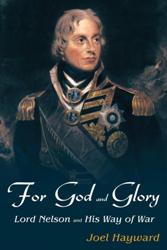 Pirates and Privateers Pirates and Privateers
The History of Maritime
Piracy
Cindy Vallar, Editor
& Reviewer
P.O. Box 425,
Keller, TX 76244-0425
    
Books for
Adults ~ Biography: Navy Seamen & Merchant Sailors

For God and Glory: Lord
Nelson and His Way of War
by Joel Hayward
Naval Institute Press, 2019, ISBN 978-1-61251-779-7, US
$24.95
    
A hero
and legend in his own time, Vice Admiral Horatio
Lord Viscount Nelson is still remembered and honored
long after his tragic death at the Battle of
Trafalgar in 1805. He is born in 1758, joins the
Royal Navy as a midshipman at the age of twelve, and
is promoted to lieutenant six years later. He is
noted for his ability to think outside the box,
especially when it comes to tactics and fighting at
sea, long before that phrase comes into use. He is
deeply devoted to God and his country, and he
sacrifices an eye, an arm, and ultimately his life
to safeguard his homeland from a man he considers
“like Satan,” “a man of blood,” and a “despoiler of
the weak” – Napoleon. (1)
The reader may ask why we need another biography of
this illustrious man, but Hayward poses a different
question in his preface: Is Nelson relevant today?
Actually, this is but the first of many questions
that he asks in light of modern warfare and
technology. We may change how we fight out enemies,
but the basic nature of warfare remains the same. In
light of this, Hayward’s goal is “to analyze Lord
Nelson’s fascinating and influential life, with
particular focus on his style of warfare and the
passions, ideas, beliefs, and behavioral patterns
that created and shaped that style, via a thematic
approach.” (xiii-xiv) This allows readers to
coherently view Hayward’s analysis of “Horatio
Nelson’s warfighting style, one that was unique to
him and made him a great leader and England’s most
brilliant admiral.” (1)
He begins by summarizing Nelson’s life and
achievements in the introduction. In the subsequent
six chapters, Hayward shares snippets from the
admiral’s own writings, as well as those of his
colleagues.
“Nelson’s Conception of His Enemies” is the focus of
the first chapter. Nelson demonstrates particular
animus toward all things and people of France. This
isn’t true initially, nor is it how he views
whatever enemy he faces, such as the Americans
during their war for independence. Why is this, how
does it affect him, and what role does this hatred
play in the way he fights to achieve victory?
Chapter two examines “The Admiral’s Spiritual
Beliefs.” That Nelson is profoundly religious isn’t
surprising, given that his father is a clergyman, as
are other members of his family, and religion is an
integral part of his studies and upbringing. His
faith, when coupled with his duty to king and
country, helps him to overcome his physical
disabilities. Nelson is prideful, ruthless when
engaging the enemy, and an adulterer – sinfulness in
the eyes of the Lord. Despite these frailties, he
remains ever faithful in his belief. Hayward
explores how Nelson makes sense of the world and his
role in the struggle between England and France, as
well as how he reconciles his shortcomings and his
religiosity. Hayward also looks at how others view
these opposing facets.
The next chapter examines Nelson’s “Command,
Leadership, and Management.” The officers and men
who serve under Nelson are totally devoted to him.
He earns their trust, inspires them to be better
than they are, and cares about them. How does he
achieve this and how is he able to master all three
aspects of leadership in times of war?
According to the United States Marine Corps,
Maneuver Warfare is “a warfighting philosophy that
seeks to shatter the enemy’s cohesion through a
variety of rapid, focused, and unexpected actions
which create a turbulent and rapidly deteriorating
situation with which the enemy cannot cope.” (100)
This definition is shared so readers unfamiliar with
the concept, which doesn’t exist in Nelson’s time
period, will understand the subject of the book’s
fourth chapter: “Nelson’s Warfighting Style and
Maneuver Warfare.” Hayward uses the fleet battle at
Aboukir Bay in 1798 to showcase how Nelson’s style
resembles this modern concept. Also included is an
enlightening discussion of just what “annihilation”
means in the past.
Not all battles that the navy wages take place at
sea, and the same is true in Nelson’s time. Chapter
five, “Nelson and War on Land,” examines whether
Nelson understands that sea-fighting strategies and
tactics do not translate well to actions on land,
and whether he is able to adapt his art of warfare
to counter these differences. If he does so, is he
successful? Hayward contrasts a siege in which
Nelson participates early in his career while in the
Caribbean, with those that later take place on
Corsica.
The final chapter explores “Coalition Warfare.”
Britain does not fight alone in the wars to defeat
Napoleon, even though the country shoulders the
brunt of the cost, fighting, and sacrifices. As an
admiral, Nelson also has to work with other nations’
navies and their officers. In this particular case,
the focus is on Nelson during the Second Coalition,
which lasts from 1798 to 1801, and the effectiveness
of his leadership as coalition fleet commander when
he has to work with Neapolitan and Portuguese
squadrons and the navies of Russia and Turkey.
For God and Glory is a fascinating analysis
of Nelson and his effectiveness during the
Napoleonic wars. Instead of being blinded by hero
worship, Hayward writes a compelling and unbiased
account of a man who is deeply religious, is aware
of his human weaknesses – even if he doesn’t always
conquer them – and is a masterful strategist and
tactician at sea when his country needs him most.
His loyalty is such that he willingly sacrifices
himself to safeguard what he holds dear, and the
concern for his men and love of country, in turn,
inspire others.
One may think this is a dry or pedantic analysis; in
actuality, it is a compelling, well-crafted, and
fascinating study of Nelson, the man. While
primarily geared toward students of military history
and warfare, as well as readers passionate about
this time period and/or Vice Admiral Lord Nelson,
novelists will find this analysis enlightening
because it is also a comprehensive character study
of the traits, both good and bad, of a convincing
hero.
Review
Copyright ©2018 Cindy Vallar

Click to contact me
Background image compliments
of Anke's Graphics |

